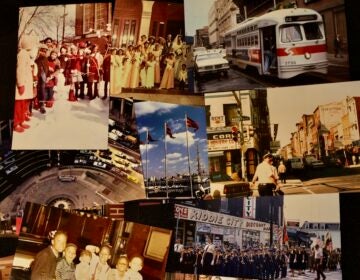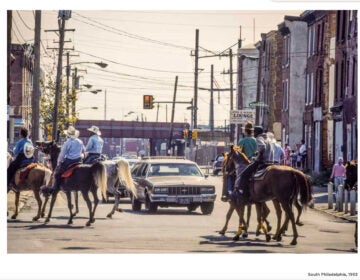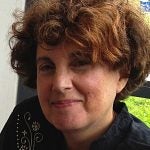Major arts supporter in Princeton gets her first exhibit
There are many luxurious spots in which to sit and relax in the home Hella McVay shares with her husband Scott McVay.
-

One of Cecil’s Four Families by Hella McVay
-
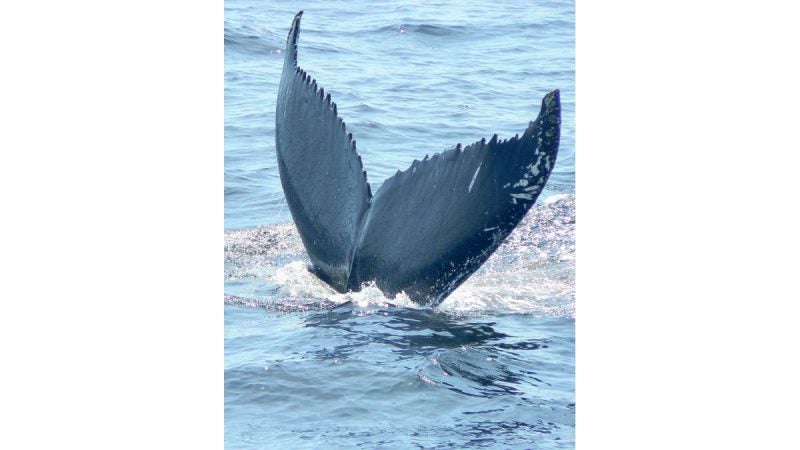
Hella McVay
-
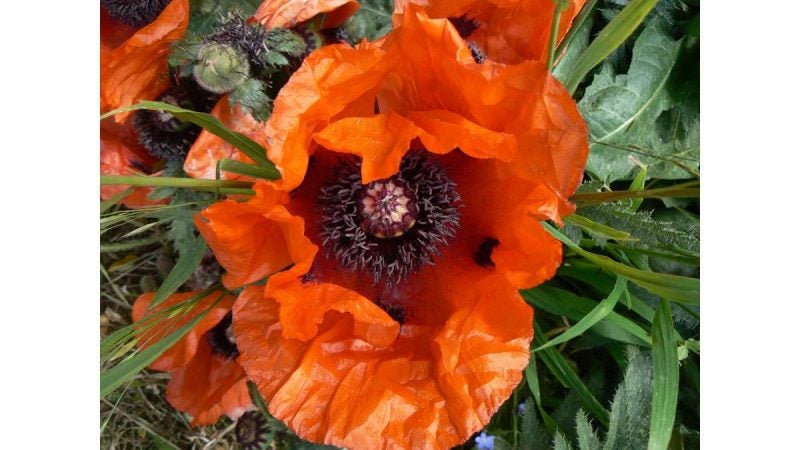
Poppy in Ushuaia by Hella McVay
There are many luxurious spots in which to sit and relax in the home Hella McVay shares with her husband Scott McVay, from the kilim-covered sofas to the wicker chairs on the patio and in the garden — yet it’s hard to imagine she ever takes the time to sit. In her 82 years, she has traveled to as many countries.
Photos from her extraordinary journeys, richly printed on canvas to look like paintings, are on view in Patterns in Nature at the Millstone River Gallery at Merwick Care & Rehabilitation Center, Plainsboro, through Nov. 17.
From an arrangement of bones in a shaman market in Zimbabwe and beloved skulls of ancestors in Papua, New Guinea, to zebras in Zambia, spotted leopards in Zimbabwe and pelicans in Ghana, these images of wildlife focus on visual elements that repeat themselves with calculated rhythms, drawing on McVay’s background as a mathematician and environmental advocate who is at home in nature, surrounded by animals.
Her husband Scott McVay displays photos from his own lens with Hella feeding monkeys in Kyoto, kangaroos in Australia, holding an orangutan in Borneo and perching her arms for parrots in Honduras. “Animals are just attracted to her,” he said.
Married for more than half a century, the couple completes each other’s sentences, and it’s often hard to separate one’s quote from the other. “That orangutan just jumped into her arms and sat on her hip,” said Scott, himself a champion of education, conservation and the well-being of mammals. The founding executive director of the Geraldine R. Dodge Foundation, Scott discovered and documented the six-octave song of the Humpback whale, along with Roger Payne, and has led expeditions to the Alaskan Arctic to study, record and film the Bowhead whale.
“Having grown up in Europe I always wanted to see the rest of the world,” said McVay. “Scott’s whale work and our interest in environmental issues has helped make this possible.

Among the other magnificent creatures Hella has brought back home, in photographic form, is Cecil, the world-famous Zimbabwe lion that was a major attraction in Zimbabwe’s Hwange National Park. McVay was on a safari in the early 2000s, following Cecil for three days. “He took such good care of all four of his families, making the rounds to check on them,” she said.
Without a telephoto lens, McVay leaned over the edge of the truck to make her shot, getting within 10 feet of Cecil and his family, but she may have come too close. “He started to charge me,” she recalled, and she pulled back and laid flat on the floor of the truck.
Cecil’s subsequent death by an American dentist’s bow-and-arrow resulted in worldwide outrage. “The whole country mourned,” recalled McVay, whose portrait of Cecil is accompanied by a Patrick McDonnell cartoon with the caption “I can’t blame you for having a fear of the dentist.”
McVay also gets up close to hippos — she paddled in a canoe to photograph them. She tells a story: “According to Zimbabwe mythology, when the creator created the world and had stuff left over, it was used to make an ugly fat creature. The hippopotamus was so embarrassed it went to live in the water, but the water animals complained it was eating all their food so at night the hippo goes out on land to eat the grass.” At night in her tent she could hear the hungry hippo eating grass. “They’re not too smart but have beauty.”
There are also patterns closer to home: a peregrine falcon in Cape May, pitcher plants in the Pinelands. And while McVay has called central New Jersey home for more than a half century, home has not always been a secure thing.
Early years
Her childhood residence in East Berlin was bombed in 1943 and she and her family fled for West Berlin where she went to school. “I was 9 when the war was over. We were always moving. My father worked in finance for a Jewish company so we were suspect. I had a spectacular grandmother who made me feel safe — she had a way of calming everything.” McVay recounted a time her grandmother put on a babushka and called in a white Russian officer, asking him what his mother would think of all the rape and killing. “From then on, my grandmother’s house became a safe house.”
She also recalled spending her childhood taking care of animals in the stable. Scott, her husband, shows a photo of her as a little girl with a lamb in Berlin.
McVay said she, and most Germans, don’t like to talk about the war years. “I’m blessed to have a great husband, fabulous daughters and sweet and spectacular grandchildren.”
Hella met Scott in 1956 at a student jazz hangout in Berlin — he was with the U.S. Army Intelligence. The American told her he wanted to improve his German and came to meet Hella’s family. “I had zero interest in terms of a relationship, but one thing led to another,” she recounted. Scott served three years but had to lengthen his tour while Hella completed her master’s degree at the University of Berlin.
Moving to Princeton
They married in Berlin in 1958 and came to Princeton to be near Scott’s parents. “We bought Danish furniture and I wanted to live in San Francisco but then got a job in Fine Hall Library at Princeton. All the famous mathematicians had been chased out of Germany, and here they were in Princeton — it was the epicenter for math and physics. I was in seventh heaven, so Scott had to find a job.”
With her knowledge of math and ability to transliterate Russian, German and French, Alonso Church hired her as assistant editor of the “Journal of Symbolic Logic.”
Around the birth of the McVays’ daughters Hella became interested in natural childbirth and La Leche—”we embraced all that ‘hippie stuff,’ because I like to be conscious and know how things work.”
Whole Earth Center
They briefly moved to Coconut Grove, Florida, when Scott worked with a dolphin laboratory, and Hella wrote the math program for a Sacred Heart school. When they returned to Princeton she founded the math department at Stuart Country Day School, and on the first Earth Day in 1970, she founded the Whole Earth Center, a nonprofit organic food store that raises funds for environmental organizations. “There were very few places where you could buy organic food then. We supported local farmers, helped to educate about pesticides and toxins, and paid employees properly with a pension and health insurance.” She served as president of the board for many years, but now she is just a shopper at the Whole Earth Center. “The prices are high but they are honest prices.”
She recounts how Wild Oats, a national chain that opened a store across the street, could not compete because the Whole Earth Center customers remained loyal. “The Whole Earth Center will be 50 in three years,” she said proudly.
Among her other convictions she put into action: As a volunteer for Planned Parenthood, she donned a white coat and worked as an assistant in the exam room, greeting patients. She had to give that up when the doctor she worked with was forced to close his practice because of threats he received.
She later joined the board of D&R Greenway Land Trust where, with Scott, she founded the Scott and Hella McVay Poetry Trail.
So how is it that, after more than half a century of marriage, she and Scott continue to work together — she has helped select poems and photographs for his books — and even share a single e-mail address?
“We complement each other,” said Hella. “He’s the English major/poet, and I’m the mathematician.”
In the late 1970s, their home burned to the ground. “She was the one who kept us all together,” said Scott.
“I’d already lost everything as a child, when my mother had to pack all our possessions in a small suitcase,” said Hella. “I knew life goes on.”
They built a new and better house. Featured on a 1984 green house tour in Princeton, and on the site where their previous stone house burned, the 1981 passive solar house gets most of its heat from a wood-burning stove. A greenhouse serves as a dining area and allows warm sunny air into the rest of the house and in warm weather, the house benefits from a two-foot overhang blocking the sun as well as overhead fans to draw in the cool air.
When it was complete, “we had a festival with the families of the workers, with live music and a barbecue.”
First exhibit
Though an ardent supporter of the arts and a regular at Princeton-area gallery openings, this is the first time McVay has ever exhibited. “I never even thought about exhibiting until (Curator Sheila Geisler) approached me. I love the idea of doing it in a rehab center,” she said. “The patterns of nature are comforting for those who are healing. I feel blessed to have looked at so many things — moss in Patagonia, lichen in Argentina, tree trunks in Indonesia.”
Though having traveled to Nepal, South and Central America, Africa, Russia, the Arctic and Antarctica — and having recently returned from a trip to Norway — the McVays still consider the biggest miracle in their own backyard, with visits from a great blue heron, frogs, bats, butterflies and pileated woodpeckers who set the drum beat.
The Millstone River Gallery is open 8 a.m.-8 p.m. The Millstone River Gallery is maintained by the Princeton Photography Club: princetonphotoclub.org. For information contact Curator Sheila Geisler: 732-672-7064.
WHYY is your source for fact-based, in-depth journalism and information. As a nonprofit organization, we rely on financial support from readers like you. Please give today.


